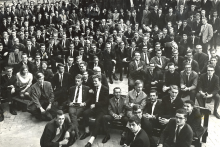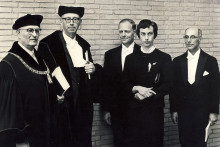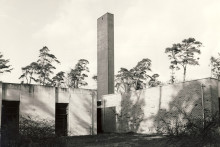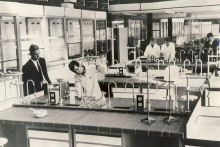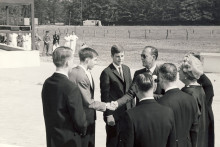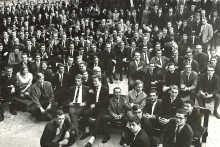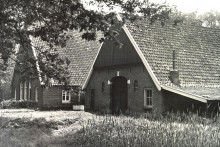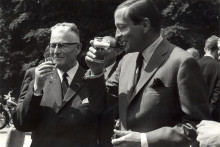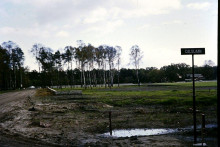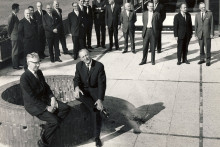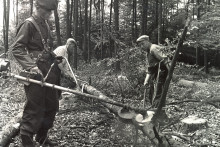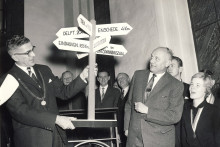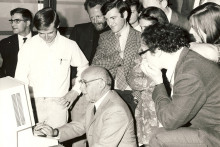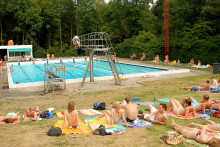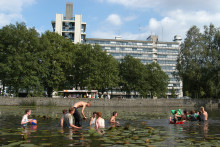Oldenzaalsestraat 125 in Enschede is a monumental white house, or rather: a villa. The Twente textiles baron Jan Herman van Heek had the Witte Huis (White House) erected in 1907. More than a century later, in 2021, the front garden features a sign by estate agent Snelder Zijlstra. ‘Office space to let.’ As Willem Wilmink wrote: ‘Textielbaronnen van weleer, hun jachtgebied bestaat niet meer' ('Textile barons of yore, their huntings grounds they are no more').
At the start of the 1960s, this same White House on the Oldenzaalsestraat was the nerve centre for the construction of the UT - or THT, as it was known at the time. Olaf Fisscher (73), UT alumnus and emeritus professor, was right in the thick of it. Literally: his parents lived next door to the villa on the Oldenzaalsestraat. As a 16-year-old boy, he regularly took a peek at the drawing board in the villa, to see how the transformation of Drienerlo country estate into campus university was progressing. ‘I can’t remember much about it. We did hear about building materials being stolen from the campus quite often, and those are exactly the kind of stories a boy that age would remember.’

The Oldenzaalsestraat villa.
History books about the UT teach us that its inaugural year was 1961. At the end of 1961, the House of Representatives agrees to the establishment of a technical university of applied sciences in Twente. This date is chosen as the official start of the UT - still called Technische Hogeschool Twente (Twente Technical University of Applied Sciences) in those days. The first sod is turned more than six months later. Everything was kept on the right track from the head office on the Oldenzaalsestraat, where it was said ‘the lights were always on’.
'I still remember they gathered some frat types from Delft for our initiation into student life'
Experiment in the forest
Young Fisscher from Enschede watches as ‘his’ future university of applied sciences take shape: in 1964, he is one of the first 200 students starting their course at THT. The freshmen - including four girls - learn about electrical engineering, mechanical engineering and chemical engineering. ‘These first years have been described as an experiment in the forest. And that was how it felt, too. I still remember, for lack of seniors, they gathered some frat types from Delft for our initiation into student life.’

At the opening of the THT.
Henk den Herder (73), one of the first 200 students like Fisscher, remembers these ‘frat tigers’ from Delft very well. ‘That’s right, they were brought in. It made sense. There was nothing on the campus, no senior students either. That’s what I liked about it. Everything still had to take shape, and that meant: anything could be any shape. It was that kind of atmosphere. For instance, I wanted to do rowing. “Arrange it”, said the head of sport. We borrowed a 4-man boat from Tubantia rowing club in Hengelo and we asked professor Greiner to be our coach. It was the start of rowing club Euros.’ The alumnus says almost all campus residents had the same pioneering spirit. ‘We had a positive attitude. A bit like: let’s make this the best it can be.’
'All these new developments somewhere far away in Twente really appealed to me'
Den Herder came to Enschede from the west of the country. ‘I was curious about what was happening on campus. All these new developments somewhere far away in Twente really appealed to me.’ And he was right: there was no lack of new developments. For instance, there was the general foundation course and the baccalaureate. The general foundation course gave the students a taster of the main technical courses of chemical engineering, electrical engineering and mechanical engineering, before they had so decide on a final discipline. ‘Extremely beneficial’, is Fisscher’s verdict almost 60 years later. ‘And don’t forget the social sciences. These subjects made up a fundamental part of your study load.’
There was a unique philosophy behind the baccalaureate. Den Herder: ‘Companies such as Shell and Unilever really needed technical students. Dutch students traditionally stayed in education until they were about twenty-seven: much too long, in other words. Manpower was needed immediately.’ The Twente baccalaureates had to be educated faster. They would join a company after three-and-a-half years of study, and learn the rest in the workplace. However, this idea didn’t really take off. According to Fisscher and Den Herder, almost everyone moved on to obtain their engineering degrees after the baccalaureate. This meant that even the Twente student became a relatively long-time student.
'Cleaners came in every day to wash up, clean the kitchen, and the beds were changed once a week'
Small-scale and self-sufficient
The general foundation course and the baccalaureate were complete unique in the Netherlands - and so was the campus. In the 1960s, it was mandatory for students to live within the university’s grounds, as it would add to their education. ‘You were given a room with a bed and a desk’, says Den Herder. I lived at Calslaan 3. It was like a hotel, really. Cleaners came in every day to wash up, clean the kitchen, and the beds were changed once a week. The ladies even made sure late risers were jostled out of bed. “Sir, you have to go to your lecture”, they would say.’ He laughs and says: ‘Something like that would be totally unthinkable nowadays of course.’

The student introduction.
According to official records, it was forbidden for freshmen to leave the campus. However, Den Herder adds some perspective. We were told this during our introduction, that’s true. “You are not allowed to leave the campus after 8 o’clock, and you are not to bring any girlfriends.” That type of thing. As first-year students, we obediently took heed. After the sermon, the frat tigers from Delft said: “You don’t really believe that, do you?” They shook us awake a little. Of course, we also had to develop a critical mind. It’s all part of being at university.’
'Everyone got to practicals on Saturday mornings slightly hungover'
There was simply not a lot going on outside the campus, according to Den Herder. ‘There was nothing to do in Enschede. Not a single pub on the Oude Markt. You had to make your fun on campus. It really was a self-sufficient community. You got to know everyone in no time, even the staff and the professors. They joined us for a beer on Friday nights too, and everyone got to practicals on Saturday mornings slightly hungover.’ The short lines between staff and students was beneficial, remembers the alumnus. ‘If we had three exams in one week, we would approach the professor and the exams would be moved.’
Those times are in the past, says Den Herder. ‘I saw this with my sons, who both studied at the UT.’ However, Fisscher feels the small-scale atmosphere is still present at the UT. And he should know: after studying at the THT, he lectured at the University of Groningen for a while. At the end of the 1980s, he returned to Twente, where he became professor of Organisational Behaviour and Business Ethics in 1992. ‘When I studied at the THT, the distance between lecturer and student was very small. But I think this is still the case compared to other universities.’
As such, Fisscher has a tip for future generations. ‘The UT remains a relatively small university. This small scale offers great advantages. Whenever I give advice to young people in my family, I will always point them towards Twente. Come to the UT to study, I tell them. It’s so much better than being a small fish in a massive pond like Amsterdam.’


